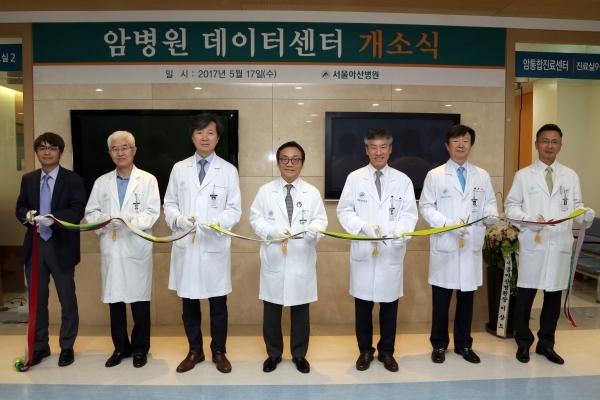With cancer survival rate increasing, life after treatment has now become more significant. Therefore, Korea is improving the quality of life of patients by eradicating cancer through the latest cancer treatment technologies, which are proven to be safe and effective. We introduce you to the newest cancer treatment technology that is leading to the advancement of the Korean medical community. <Editor’s note>

The importance of big data in cancer treatment is growing. This is because big data from cancer patients can offer personalized treatments for individuals by analyzing genetic information, examination images, surgery, and anticancer therapy reports.
Asan Medical Center (AMC) in Seoul is equipped with enough data to collect a database of cancer treatments as about 900,000 cancer patients visit the hospital, and around 20,000 operations are performed annually.
Accordingly, AMC inaugurated the "Cancer Institute Data Center" in 2017. The goal is to provide customized treatment for each patient by utilizing clinical data accumulated beyond cancer treatment.
Clinical data refers to comprehensive information of patients with specific diseases: prescription of drugs, surgery, radiotherapy, pathological tests, diagnostic tests, and imaging tests.
Clinical data are hard to collect and analyze because of different information needed by cancer types for research and the scattered cancer data from other medical departments and researchers. However, a complete establishment of the data center will allow verification of reliability through the process of collecting data and inputting the system, improving data quality.
Now fourth-year into its opening, AMC’s Cancer Institute Data Center has finished developing a system to collect data from 10 types of cancer: colon cancer, breast cancer, stomach cancer, and lung cancer, etc., while the rest four types including liver cancer, biliary cancer, and pancreatic cancer are almost complete.
AMC is stepping beyond by developing an integrated platform of precision medicine to generate big data. Once completed, it will be equipped with technology that visualizes patients' overall clinical and genetic testing information on a single screen.
"So far, there has been a hassle of having to check dielectric information and treatment records one by one under categories when treating cancer patients. But we expect an increased efficiency of dielectric data in conquering cancer as we will be able to perceive every information about patients at a glance once the development is complete,” Yu Chang-Sik, head of the Cancer Institute of AMC and professor at the department of the colon and rectal surgery explained.
Regarding some criticisms on the risk of private information leakage, AMC claimed that they delete basic information used in identifying individual patients and issue a new ID for research purposes with approval from the clinical research review committee of the hospital as a measure for double protecting personal information.
"AMC is a Korea's leading cancer treatment and research institution which introduced Korea's first multidisciplinary, integrated treatment, operated the world's first emergency room for cancer patients, passed clinical validation of NGS tests. We plan further to present new standards on medical data utilization by putting more effort into constructing an integrated platform of precision medicine," Prof. Yu emphasized.


